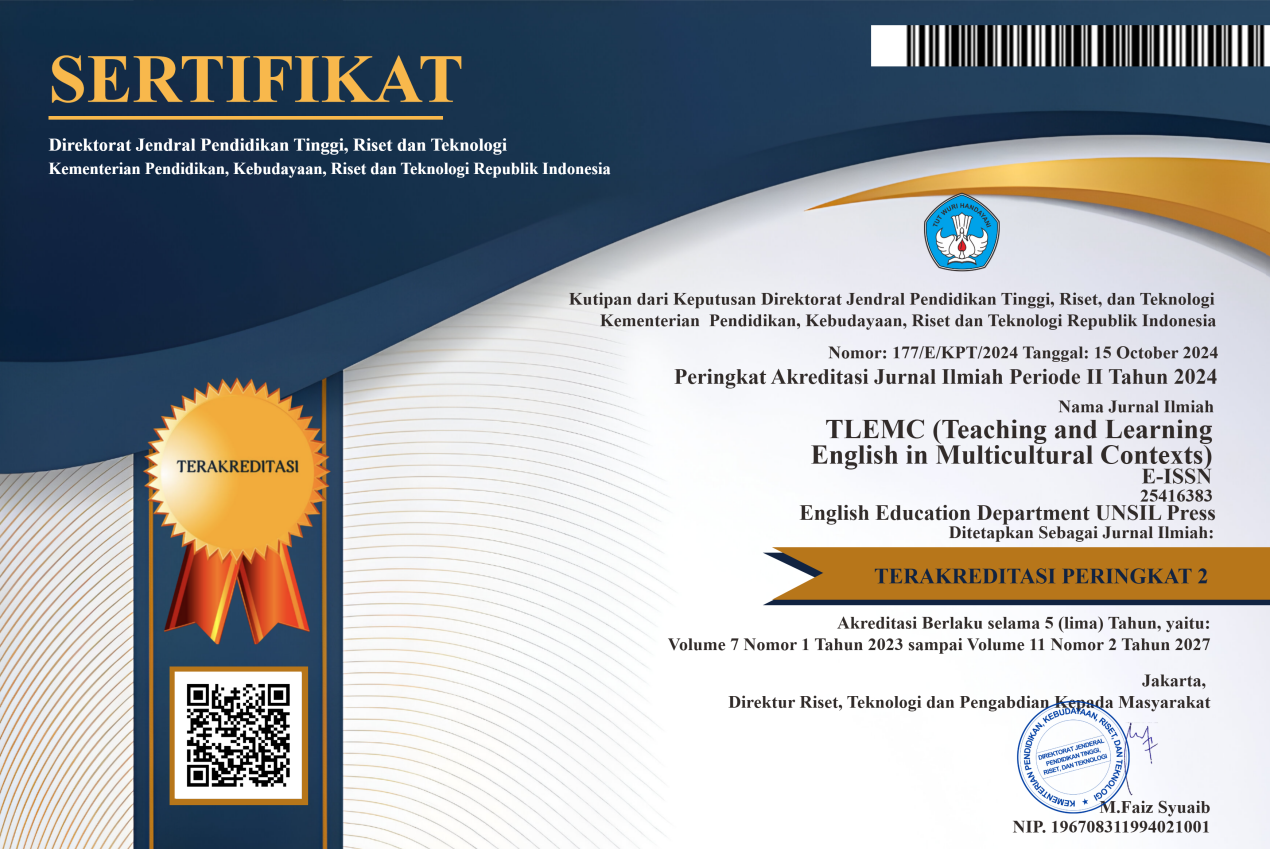Teachers’ Perception of Parental Involvement of Primary Students: A Case Study in EYL Context
Abstract
Parental involvement of primary students is essential since it can contribute on their educational outcomes and development. Especially for learning English as a foreign language, parents play the prime source in developing their engagement and responsibility to have positive academic achievement in their early development. As well as their teachers, parents need to connect with school activities and be responsible in providing services to the children in education delivery. In this study, teachers’ perception of parental involvement in the process of learning English of primary students was investigated.  It focuses on analyzing perception of three elementary school teachers who had experience in teaching English for more than 15 years. Data were collected by conducting semi-structured interviews and analyzed using thematic analysis (Braun & Clarke, 2006). Descriptive case study was used as the research design because of the phenomenon that occurs in the involvement of parents in learning English to primary students. The results of this study involve three major themes. They are; 1) students' language development 2) teachers feeling, and 3) cooperation carried out by teachers and parents. As a conclusion, relationship between parents and teachers can have a positive impact. It opens valuable opportunities for children to develop language skills (especially English), and allows brilliant English achievements.
Full Text:
PDFReferences
Al Mahrooqi, Denman & Maamari. (2016). Omani Parents’ Involvement in Their Children’s6 English Education. Sage Open. 1-12.
Al Sumaiti, R. (2012). Parental Involvement in Education of their Children in Dubai, Dubai School of Government. Policy Brief, No. 30, 1-8.
Braun, V and Clarke, V.(2006). Using Thematic Analysis in Psychology. Qualitative Research in Psychology. 3(2). 77-101.Braun, V and Clarke, V.(2006). Using Thematic Analysis in Psychology. Qualitative Research in Psychology. 3(2). 77-101.
Bureau Family-School and Community Partnerships. (2011). Parent
engagement in children’s education. Canberra, Australia: Author.
Chen Bing & Gregory Anne. (2010). Parental Involvement as a Protective Factor During the Transition to High School. University of Virginia: Routledge. 103:1. 53-62.
Eaford, LaTonya. (2018). Teacher Perceptions of Parental Involvement at an Inner-City K-8 Center in the United States. Walden University ScholarWork. 1-176.
Epstein, J. L. (1995). School/family/community partnerships. Phi Delta Kappan, 76(9), 701-713.
Gulevska Valentina. (2017). Teachers’ Perceptions of Parental Involvement in Primary Education. Brief Science. 134-140.
Harmer, Jeremy. (2001). The practice of English language teaching. London: Longman.
Hashim, Ariffin,Abdullah, Bakar Yusuf, Maniam. (2018). Parental Involvement in Primary School: Understanding the strategies that promote academic achievement. Science International. 30. 665-669.
Jafar Javid. (2015). Factors Affecting Parental Involvement in Education: The Analysis of Literature. Research Gate: Khazar Journal of Humanities and Social Sciences. 18(4). 35-44.
Kalayci and Oz. (2018). Parental Involvement in English Language Education: Understanding Parents’ Perceptions. IOJET. 5(4). 832-847.
LaRocque, M., Kleiman, I., & Darling, S. M. (2011). Parental involvement: The missing link in school achievement. Preventing School Failure. 55(3). 115-122.
Liou, P.-Y., Wang, C.-L., & Lin, J. J. H. (2019). Pathways of parental involvement through students’ motivational beliefs to science achievement. Educational Psychology. 39. 960–980.
Mahmoud Salameh. (2018). Saudi Parents' Perceptions of the Kind of Help they Offer to their Primary School Kids. Canadian Center of Science and Education. 11(3). 102-112.
Prastowo, A., & Fitriyaningsih, F. (2020). Learning Material Changes as the Impact of the 2013 Curriculum Policy for the Primary School/Madrasah Ibtidaiyah. Edukasia: Jurnal Penelitian Pendidikan Islam, 15(2), 251-276.
Zaidah, Z.. (2007). Case Study as a Research Method. Jurnal Kemanusiaan. 1-6.
DOI: https://doi.org/10.37058/tlemc.v5i0.3782
Refbacks
- There are currently no refbacks.
INDEXED BY:
This work is licensed under a Creative Commons Attribution-NonCommercial-ShareAlike 4.0 International License.
![]()
TLEMC (Teaching and Learning English in Multicultural Contexts)
Program Studi Pendidikan Bahasa Inggris
Fakultas Keguruan dan Ilmu Pendidikan
Universitas Siliwangi
Jl. Siliwangi No. 24 Kota Tasikmalaya - 46115
email: tlemc@unsil.ac.id





